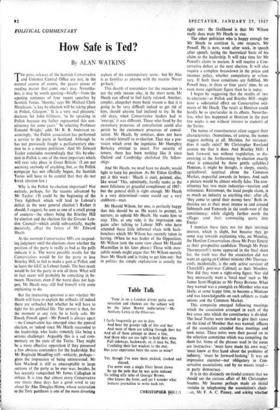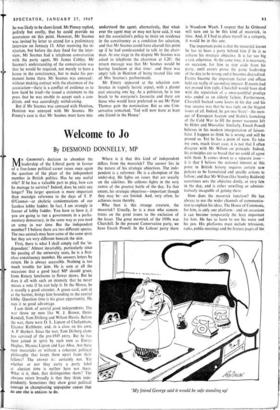How Safe is Ted?
POLITICAL COMMENTARY
By ALAN WATKINS
MHE press releases of the Scottish Conservative I and Unionist Central Office are not, in the normal course of events, the gayest pieces of reading matter that come one's way. Neverthe- less, it may be worth quoting—briefly—from the opening sentences of four recent speeches by Scottish Tories. 'Shortly,' says Mr Michael Clark Hutchison, 'a key by-election will be taking place in Pollok, Glasgow.' It is a very real pleasure,' declares Sir John Gilmour, 'to be speaking in Pollok because my father represented this con- stituency for some years.' In selecting Professor Esmond Wright,' adds Mr R. B. Anderson re- assuringly, 'the Pollok association has performed a service to the party in Scotland. Although he has not previously fought a parliamentary elec- tion he is a mature politician.' And Mr Edward Taylor concludes resoundingly that 'this by-elec- tion in Pollok is one of the most important which will ever take place in Great Britain.' (I am not accusing anybody of anything, but, as the Pollok campaign has not officially begun, the Scottish Tories will have to be careful that they do not break election law.)
Why is the Pollok by-election important? Not entirely, perhaps, for the reasons advanced by Mr Taylor. (It could be the beginning of the Tory fightback which will lead to Labour's defeat in the next general election.') Rather it should, I suggest, be seen as one of a small group of contests—the others being the Brierley Hill by-election and the election for the Greater_Lon- don Council—which could substantially, maybe decisively, affect the future of Mr Edward Heath.
At the moment Conservative MPs are suspend- ing judgment until the elections show whether the position of the party is really as bad as the polls indicate it is. The worst possible results for the Conservatives would be for the party to lose Brierley Hill, to fail to make a gain at Pollok and to leave the GLC in Labour hands. The best result would be for the party to win all three. What will in fact occur will probably be something in be- tween. However, even if the worst does not hap- pen, Mr Heath may still find himself with some explaining to do.
But the interesting question is not whether Mr Heath will have to explain the setbacks (if indeed there are setbacks) but whether he will have to fight for his political life. The answer is that, for the moment at any rate, he is fairly safe. Mr Enoch Powell apart—Mr Powell is always apart —no Conservative has emerged since the general election, or indeed since Mr Heath succeeded to the leadership, who looks remotely like being a serious challenger. Arguably this is a sad com- mentary on the state of the Tories. They might be a more effective opposition if they possessed a few obvious contenders for the leadership. But Mr Reginald Maudling still—unfairly, perhaps— gives the impression of being uninterested. Mr Iain Macleod is still as unacceptable to large sections of the party as he ever was; besides, he has scarcely vanquished Mr James Callaghan in debate. It is true that almost every Conservative one meets these days has a good word to say about Sir Alec Douglas-Home, whose restoration to the Tory pantheon is one of the more diverting aspects of the contemporary scene: but Sir Alec is as familiar as anyone with the maxim 'Never go back.'
This dearth of contenders for the succession is not the only reason why, in the short term, Mr Heath can afford to feel fairly relaxed. Another, simpler, altogether more basic reason is that it is going to be very difficult indeed to get rid of him, should anyone feel inclined to try. In the old days, when Conservative leaders had to `emerge,' it was different. Those who lived by the customary processes of consultation could also perish by the customary processes of consul- tation. Mr Heath, by contrast, does not have to submit himself to re-election. That was a pro- vision which even the ingenious Mr Humphry Berkeley omitted to insert. For security of tenure, there has been nothing like it since Oxford and Cambridge abolished life fellow- ships.
And Mr Heath, we need have no doubt, would fight to keep his position. As Mr Eldon Griffiths put it this week : 'Heath is steel, painted, alas, like wood.' This, admittedly, hardly ranks as the most felicitous or graceful compliment of 1967: but the general drift is right enough. Mr Heath is a very determined—some would say a very stubborn—man.
Mr Harold Wilson, for one, is perfectly happy that this should be so. He wants to protect, to nurture, to uphold 'Mr Heath: He wants him to stay. This, at any rate, is the impression one gains after talking to Labour MPs who have attended those little informal chats with back- benchers which Mr Wilson has recently taken to having. (When he was leader of the Opposition, Mr Wilson took the same view about Mr Harold Macmillan in his later phase.) Those with over- subtle minds might argue that Mr Wilson secretly fears Mr Heath and is trying to get him out: but in politics the simple explanation is usually the right one: the likelihood is that Mr Wilson really does want Mr Heath to stay.
The other politician who is happy enough for Mr Heath to continue is, one suspects, Mr Powell. He is now, week after week, in speech after speech, laying the theoretical basis of his claim to the leadership. It will take time for Mr Powell's claim to mature. It will require a Con- servative defeat at the next election. It will also require a complete breakdown in the prices and incomes policy, whether compulsory or volun- tary. If both these conditions are fulfilled, Mr Powell may, in three or 'four years' time, be an even more significant figure than he is today.
I began by suggesting that the results of two by-elections—at Pollok and Brierley Hill—might have a substantial effect on Conservative esti- mates of Mr Heath. The result at Honiton could hardly be so spectacular in its effects. Neverthe-
less, what has happened at Honiton in the past few weeks is not without interest to students of the Tories.
The names of constituencies often suggest their characteristics. (Sometimes, of course, the names suggest nothing at all. Meriden, for instance: does it really exist? Mr Christopher Rowland assures me that it does. And Brierley Hill: I look forward, not without trepidation, to dis- covering at the forthcoming by-election exactly what is concealed by those gentle syllables.)
Honiton, it might be thought, is sleepy, sturdy,
agricultural; sceptical about the Common Market, respectful towards its betters. And such a picture would be almost wholly false. The con- stituency has two main industries—tourism and retirement. Retirement, the local people claim, is
as .much an industry as anything else: after all, `they come to spend their money here.' Both in- dustries are at. their most intense in and around Sidmouth and Exmouth in the south-west of the constituency; while slightly fUriher north the villages send: their commuting quota into Exeter.
I mention these facts not kir their intrinsic interest, which .is slight, but becanse they'-go
some way' towards explaining why, on Monday, the Honiton Conservatives chose Mr Peter Emery as their prospective candidate. Though Mr Peter Thorneycroft's name appeared in the final short list, the truth was that the association did not want an ageing ex-Cabinet minister (Mr Thorney- croft, incidentally, is the only active survivor of Churchill's post-war Cabinet) as their Member. Nor did they want a right-wing figure. Nor did they necessarily want a 'local man' such as Mr James Scott-Hopkins or' Mr Percy Browne. What they wanted was a youngish ex-Member who was likely, at some happy time, to become a Minister and was knowledgeable on such subjects as trade unions and the Common Market. '
This composite emerged following meetings which the association arranged in each of the five areas into which the constituency is divided.
The local Tories were invited to give their views on the kind of Member that was wanted; officers of the association attended these meetings and took notes. These notes were then passed on to the selection committee which was compiling the short list. Some of the phrases used in the notes are instructive: 'must have made his own way,' `must know at first hand about the problems of industry,' must be forward-looking.' It was an impressive exercise—not obligatory in Con- servative associations, and by no means usual— in party democracy.
It is in this distinctly un-feudal context that we should see the curious affair of Mr Christopher
Soames. Mr Soames perhaps made an initial mistake in telephoning the association's chair- . an, Mr F. A. C. Pinney, and asking whether
he was likely to be short-listed. Mr Pinney replied, politely but coolly, that he could provide no assurances on this point. However, Mr Soames was invited by letter to attend for a preliminary interview on January 13. After receiving the in- vitation, but before the date fixed for the inter- view, Mr Soames had a telephone conversation with the party agent, Mr James Cobley. Mr Soames's understanding of the conversation was that he would be required, not merely to have a house in the constituency, but to make his per- manent home there. Mr Soames was annoyed : without making contact with the chairman of the association—there is a conflict of evidence as to how hard he tried—he issued a statement to the press that he was unable to accept such a con- dition, and was accordingly withdrawing.
But if Mr Soames was annoyed with Honiton, Honiton was annoyed with Mr Soames. Mr Pinney's case is that Mr Soames must have mis- understood the agent; alternatively, that what- ever the agent may or may not have said, it was not the association's policy to insist on residence in the constituency as a condition for selection, and that Mr Soames could have cleared this point up if he had condescended to talk to the chair- man. At one stage in the dispute Mr Soames was asked to telephone the chairman at 1.20: the return message was that Mr Soames would be having luncheon at that time : and there was angry talk in Honiton of being treated like one of Mrs Soames's parlourmaids.
Mr Emery appeared at the selection con- ference in vaguely heroic aspect, with a plaster cast encasing one leg. As a politician, he is too brash to be everyone's favourite and there are those who would have preferred to see Mr Peter Thomas gain the nomination. But as one Con- servative remarked, 'Ted will now have at least one friend in the House.'



































 Previous page
Previous page